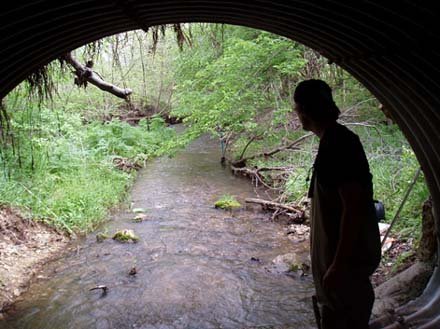Impacts of Road Crossings on Prairie Stream Fishes
Investigators:

Wes Bouska, M.S. student
Dr. Craig Paukert
Project Supervisor:
Dr. Craig Paukert
Funding:
Kansas Department of Transportation Cooperators
Kansas Department of Wildlife and Parks
US Fish & Wildlife Service, Kansas Department of Transportation
The Watershed Institute, Inc.
Location:
Flint Hills stream in Northeast Kansas
Completion:
March 2009
Objectives:
Quantify fish passage among different road-stream crossing designs both in the Kansas Flint Hills and in controlled experimental streams and determine which crossing design is best for fish passage.
Progress and Results:
Inappropriate road-stream crossings may prohibit the movement of stream fishes by creating physical or behavioral barriers. Impeding the natural migrations of these fish can result in negative impacts including reductions in species abundance and diversity, loss of genetic diversity, habitat fragmentation, and species extirpation. A mark-recapture study was conducted to evaluate fish passage through three types of vehicle crossings located on streams that contain federally endangered Topeka shiners (Notropis topeka) in the Flint Hills of Northeast Kansas. We tested passage through five concrete box culverts, five low-water crossings (concrete slabs vented by one or multiple culverts), and two single corrugated culverts. In addition, each site had a control reach where fish were marked below a natural barrier in the same stream allowing movement patterns to be compared between control and road crossing reaches for each site. A total of 6,539 fish including 192 Topeka shiners were marked in April and May 2007 and 723 (11.1%) were recaptured in June, July, and August 2007. Fish passage occurred at all crossing types. However, Topeka shiner passage was observed only through box culverts and corrugated culverts. Of the recaptured fish at each site, upstream movement was higher at the controls (41.1%) than at the crossing reaches (19.1%) for low-water crossings (P<0.0001). There was no difference in the proportion of fish that moved upstream, compared to control reaches, at box culverts (P=0.665) or corrugated culverts (P=0.171). These results suggest that crossing type affects the degree of fish passage, with low-water crossings having the greatest impact. Use of properly designed and installed crossing structures has great promise in conserving critical stream habitat, preserving native fish communities and aiding the recovery of the Topeka shine
Products:
Bouska, W. W., and C. P. Paukert. 2010. Effects of visible implant elastomer mark color on the predation of red shiners by largemouth bass. Fisheries Management and Ecology 17:294-296.
Bouska, W. W., and C. P. Paukert. 2010. Road crossing designs, their effect on prairie stream fishes, and an update on the Topeka shiner. Dakota Chapter of the American Fisheries Society annual meeting, Spearfish, SD.
Mammoliti, K., W. Bouska, and C. Paukert. 2010. Seasonal stockpiling of prairie stream fishes below road crossings in the flinthills of Kansas. Kansas Natural Resources Conference, Wichita, KS.
Bouska, W. W. and C. P. Paukert. 2008. Effects of road crossing design on movement and species composition of Great Plains stream fishes. Kansas Natural Resources Conference, Wichita, KS.
Bouska, W. W. and C. P. Paukert. 2007. Impacts of Road Crossings on Prairie Stream Fishes. Midwest Fish and Wildlife Conference, Madison, WI.